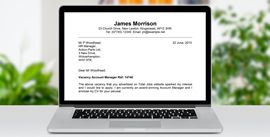10 Deadly CV Writing Mistakes That Will Cost You Job Interviews

You can share this article by clicking on the buttons below:
Find out how to fix your CV and win more job interviews from both employers and recruiters:
- Having looked at many 1000s of CVs over the years at Bradley CVs (as part of our professional CV service), we've compiled a list of 10 of the deadliest CV writing mistakes that can stop you getting the interviews that you want.
- Fix these mistakes and you'll make it far easier for both the employers and recruiters reading your CV to say "Yes, let's interview this person".
- Please note the list below isn't exhaustive, we'll cover further CV writing mistakes in future articles.
1. Your CV isn't relevant to the needs of the employer / recruiter
- It's no good harping on about what you think the employer wants to hear if what you are saying doesn't meet their needs. Think clearly about the skills and experience that you want to promote on your CV.
- Avoid the 'I could do that job' syndrome - make sure that you've met the main criteria for the jobs that you are applying for, spell it out and keep your CV focussed and show how you can make a quantifiable difference.
- Remember at all times that your CV is your sales brochure and it must promote relevant transferable skills and expertise and must clearly demonstrate your capacity to tangibly ADD VALUE through the deployment of your skills and experience.
- For instance, if the job adverts says that you must have a specific degree / qualification and 10 years' experience, make sure that you've demonstrated that you have the required qualification / experience on your CV.
2. You have neglected to include content at the top of page one that will captivate the employer / recruiter
- Your CV needs to excite the reader and captivate them with compelling content, all within the first 30 seconds! That's how long the average reader of your CV will spend looking at your CV.
- So make sure you put the most important information right at the start of your CV, otherwise you'll very quickly lose their attention and they'll just move on to the next CV (or next task) in their busy day.
- Anything you list on page 2 may not be seen by a busy employer, so don't 'hide' vital information on page 2 that is critical to the jobs that you are applying for - an employer may just miss it.
3. You got so wrapped up in the need to sell your talent that your CV is 7 pages long and full of detail
- Your CV shouldn't be simply a list of duties / responsibilities taken from the job descriptions of every job you've ever done - these aren't personal and of course are generic, anyone doing a similar job could put their name at the top and the CV would equally apply to them!
- So think sales brochure and not CV! No one has the time to read 7 pages.
- If you cannot say it in 2 pages, it probably isn't worth saying! Keep your CV to 3 pages maximum.
4. The information is not presented in the expected sequence
- Remember the 30 second window to make the right impression? Putting things like your education from 20 years ago first at the top of page one, is hardly going to get the reader salivating. They want to buy into your suitability first.
- Please check out our Example CVs, which include a graduate CV example to learn how you should structure your CV.
5. Including details of positions you held 15 years ago
- A decision to interview you will probably be made before hitting the bottom of page one. So listing every job you've ever had will probably not help them, plus it can make your CV much longer than two pages if you've had quite a number of jobs.
- Normally, you should focus most on the last 2 to 3 jobs and go back about 10 years - but of course if you've only had a couple of jobs in your entire career, then you need to include both jobs even if the first one was more than 15 years ago.
6. Inserting your secondary school education / 'O' levels from over 30 years ago
- You need to keep your CV relevant and write it from a cup half-full perspective. Don't age yourself by including dated very old and irrelevant education / training details.
- Will this win you an interview? Will it entertain the reader? Will they be delighted to read about an event that took place all that time ago? No!
7. There is no 'Elevator Pitch' at the beginning
- This is an American term and is about when you get into an elevator (lift) and then have to sell yourself to a complete stranger before the doors open.
- Just like an 'Elevator Pitch', the first part of page one of your CV must sell you directly to an employer - it must grab their attention if you want to get an interview.
- Luckily the creation of a CV is not spontaneous, unlike a real elevator pitch where you have to deliver your sales pitch instantly, you have an unlimited amount of time to prepare your sales pitch for the first part of your CV - but, use your time wisely!
8. You have failed to give the employer / recruiter a reason to interview you
Why should you be given an interview if your CV reads like every other CV that they've received? Your CV must stand out from all the other CVs, otherwise you simply won't get many / any interviews.
You must shout out about how good you are - there is a fine line between arrogance and modesty, but never undersell yourself.
Think about what you've achieved at each of the jobs that you've had:
- How have you done things better?
- How have you improved things?
- Have you saved / made money for your employers?
- How have you added value or made a difference?
The better paid jobs in any profession attract fierce competition, so if you're aiming for one of these jobs, you'll need a superior CV if you want to land job interviews.
9. The way you have written your CV means it is like a book
- Whilst subjective your new CV should look easy to read, with no small or over fancy fonts, which can make your CV much harder to read, especially if the font you picked isn't installed on the device that the reader is using to view your CV!
- Use bullet points for the main body of your CV, rather than large swathes of long-winded text that look difficult to read.
- Make your CV inviting to read, lessen the detail and present headline grabbing information. Remember, your CV is not a transcript of a face-to-face conversation!
10. Will the inclusion of hobbies win you an interview?
- Will listing eating out, socialising and surfing the net make you stand out against all the other job applicants that applied for the same job as you?
- Normally, if you have a fair amount of work experience, it would be better and far more compelling for the reader if you leave out hobbies / interest and use the space instead for your work experience.
- However, if you have a hobby or interest that directly relates to the job/s you are applying for, you should list it and include enough detail so the reader of your CV can appreciate how it would add value.
- For example, a recent graduate applying for a management trainee programme should include details of all leadership roles that they've had at school, college and university - they should still leave off the eating out and socialising.
Make your CV stand out and you'll win more job interviews!
- Your CV must entertain and delight employers and recruiters, both will be extremely busy people who yearn to be wooed instantly.
- If your CV doesn't impress them, a rival applicant will steal your interview and to rub salt in the wound, they might not be as good as you at doing the job.
- They won the interview and beat you because they marketed their talent on their CV a lot more effectively than you did.
- So you must grasp this opportunity by writing your CV in a way that promotes your skills and experience linked to a tangible ability to make a real difference - make sure you get this right and you'll win plenty of interviews.
Share This Article
You are welcome to share this article by clicking on the buttons below:
Want to win more interviews?
A professional CV service can improve your CV and help you win the interviews you want, even if your CV contains lots of deadly CV writing mistakes.
Other pages to visit:






